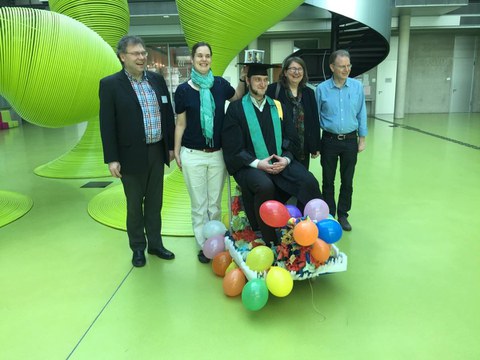Apr 03, 2017
Thomas Kühn hat am 03.04.2017 seine Doktorarbeit erfolgreich verteidigt.
A Family of Role-Based Languages
Role-based modeling has been proposed in 1977 by Charles W. Bachman, as a means to model complex and dynamic domains, because roles are able to capture both context-dependent and collaborative behavior of objects. Consequently, they were introduced in various fields of research ranging from data modeling via conceptual modeling through to programming languages. More importantly, because current software systems are characterized by increased complexity and context-dependence, there is a strong demand for new concepts beyond object-oriented design. Although mainstream modeling languages, i.e., Entity-Relationship Model, Unified Modeling Language, are good at capturing a system's structure, they lack ways to model the system's behavior, as it dynamically emerges through collaborating objects. In turn, roles are a natural concept capturing the behavior of participants in a collaboration. Moreover, roles permit the specification of interactions independent from the interacting objects. Similarly, more recent approaches use roles to capture context-dependent properties of objects. The notion of roles can help to tame the increased complexity and context-dependence. Despite all that, these years of research had almost no influence on current software development practice.
To make things worse, until now there is no common understanding of roles in the research community and no approach fully incorporates both the context-dependent and the relational nature of roles. In this thesis, I will devise a formal model for a family of role-based modeling languages to capture the various notions of roles. Together with a software product line of Role Modeling Editors, this, in turn, enables the generation of a role-based language family for Role-based Software Infrastructures (RoSI).

